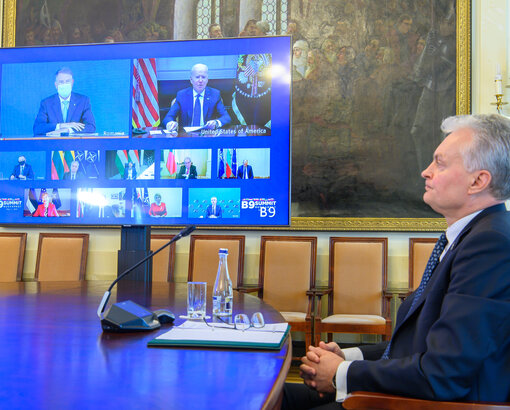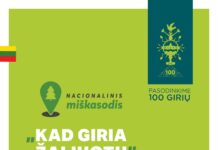
On May 10 a meeting was held in preparation for a NATO summit that is to take place in Brussels in June. The president of Lithuania and the leaders of other countries of NATO’s eastern flank met to discuss and assess the existing security situation as well as challenges for defence and deterrence, in the context of Russia’s aggressive actions. Called the Bucharest Nine (B9), the group consists of nine countries in Eastern and Central Europe – Bulgaria, the Czech Republic, Estonia, Latvia, Poland, Lithuania, Romania, Slovakia, and Hungary. The format was launched in 2015 in response to Russian aggression in Ukraine in 2014.
Speaking at the virtual summit, Lithuanian president Gitanas Nausėda addressed B9 leaders, U.S. President Joe Biden and NATO Secretary General Jens Stoltenberg, emphasizing that the security challenges and threats posed by Russia required NATO allies and partners to place increased focus on credible deterrence and defense. The President pointed out that Russia’s unprecedented military build-up on the Ukrainian border only confirmed that it did not intend to abandon aggressive behavior and continued to threaten their sovereignty and territorial integrity in order to intimidate neighbouring countries.
“Russia remains the key long-term threat to NATO,” the President said, stressing that the Alliance would only overcome challenges through unity, solidarity and resolve. Nausėda underscored the indispensable significance of the transatlantic bond. Europe cannot stay united and secure without U.S. involvement: the presence of American troops in the Baltic and Black Sea regions is the strongest deterrent. The President pointed out that Russia’s growing military threats could only be offset by sufficient NATO defense and deterrence capabilities on the eastern flank. It means that NATO countries must continue to invest consistently in defense.
He said that Lithuania would continue to take care of its own security by increasing defense spending to 2.5% of GDP by 2030. It will also boost expenditure on military equipment, infrastructure and host nation support.
The President expressed hope that principled decisions would be made at the NATO summit in Brussels on June 14th, decisions that are necessary for the Alliance to adapt to the ongoing changes in the complex security environment and to ensure indivisible collective defense.
“The NATO 2030 process will allow us to build an effective deterrence and defense architecture with the necessary resources. We need to remain vigilant, to keep focus on the threats posed by Russia, to build a stronger transatlantic link, to increase defense budgets and common funding, and to reinvigorate NATO’s Open Door policy,” the President said.
Nausėda urged the Bucharest Nine countries to actively support the Enhanced Opportunities Partners – Ukraine and Georgia – and to help them realize their euroatlantic aspirations through membership in NATO. He stressed that Ukraine, still suffering from Russian aggression, is in special need of NATO’s support and assistance.
The President asked the participants to support Lithuania’s bid to host the 2023 NATO Summit in Vilnius.
News from the Office of the President of Lithuania





























